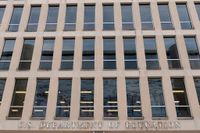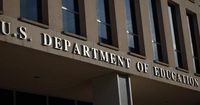On March 20, 2025, President Donald Trump signed an executive order initiating the dismantling of the United States Department of Education, a move that has drawn immediate criticism from lawmakers, educators, and advocacy groups across the nation. The order allows the Secretary of Education, Linda McMahon, to take necessary steps toward closing the department, which critics fear could endanger vital funding and services for students and schools.
State Senator Katie Muth (D-Chester/Montgomery/Berks) was swift to condemn the executive order, stating, "It took exactly two months for the Trump Administration to attempt to end over 40 years of progress, protections, and opportunities for students across the country and in the Commonwealth." Muth emphasized that this action represents a broader campaign to privatize education and enrich wealthy individuals at the expense of students and teachers.
Trump's directive also requires the transfer of responsibilities traditionally held by the education department to other agencies, including the Small Business Administration (SBA) and the Department of Health and Human Services (HHS). According to Trump, the SBA will oversee the federal student loan portfolio, previously managed by the education department, while HHS will handle programs for students with disabilities. He stated in the Oval Office, “I’ve decided that the SBA, the Small Business Administration, will handle all of the student loan portfolio.”
However, experts predict that this transition may not be straightforward and could result in confusion and complications for millions of borrowers. Trump’s announcement follows a significant reduction in staffing at the education department, with a 40 percent cut reported just a week prior to the order's signing. Critics like Jessica Thompson from The Institute for College Access and Success voiced concerns, stating, "It’s a recipe for chaos and frustration for millions of people who rely on the student loan program."
In states like Pennsylvania and New Jersey, the potential fallout from these changes could be severe. Pennsylvania public schools depend on approximately $4.67 billion in federal funding while New Jersey schools receive about $1.2 billion. Financial support from the federal government, particularly under Title I, which assists schools serving low-income communities, and the Individuals with Disabilities Education Act (IDEA), is critical for the operation of many educational programs.
Arthur Steinberg, President of the Philadelphia Federation of Teachers, highlighted that 1,449 jobs in Philadelphia alone are funded by Title I and IDEA resources. Reflecting on the broader implications, Robert Kim, Executive Director of the Education Law Center in New Jersey, warned that the loss of federal funding could threaten up to 18,000 teaching positions statewide.
As changes commence, the handling of student loans will migrate to the SBA, which has also announced significant workforce reductions. With the education department previously managing $1.6 trillion in student loan debt, the transition raises concerns about the future of critical programs and supports. Trump has promised that funding streams will not be disrupted, claiming that "critical funding streams that schools rely on will continue to flow to states,” yet many experts remain skeptical of this assertion.
Significantly, the executive order also affects administrative bodies like the Education Department’s Office for Civil Rights (OCR). Following staffing cuts, this office has been critically limited, as it previously handled regional offices across the country, providing vital legal resources to families pursuing civil rights complaints in education. Deborah Gordon Klehr, executive director of the Education Law Center in Pennsylvania, noted that the absence of such resources could prove detrimental as parents are now left with fewer avenues to seek justice.
Furthermore, advocates for students with disabilities fear that shifting oversight of critical services to HHS could lead to setbacks, especially with historic figures like Bobby Kennedy at the helm, given his controversial stance on health issues including vaccines. As this dramatic restructuring of education continues, many anticipate it will spark legal challenges and vigorous public debate. Many state leaders are urging constituents to contact their representatives to demand action and accountability amidst this ongoing upheaval.
Representative Paul Takac voiced concerns regarding the broader implications of dismantling the education department, stating, “There’s so much uncertainty and, quite frankly, chaos coming from a decision like this.” Chris Lilienthal from the Pennsylvania State Education Association emphasized that the executive order jeopardizes $1.6 billion in funding for essential educational programs in Pennsylvania, including special education services and early learning initiatives.
The upcoming months will likely see increased tensions between Trump’s administration, state governments, and educational institutions as stakeholders navigate the implications of dismantling a federal agency tasked with ensuring equal access to education and upholding the rights of students. With potential legal battles on the horizon, many educators and advocates are gearing up for what they foresee will be an intense fight to protect the educational rights of students nationwide.





